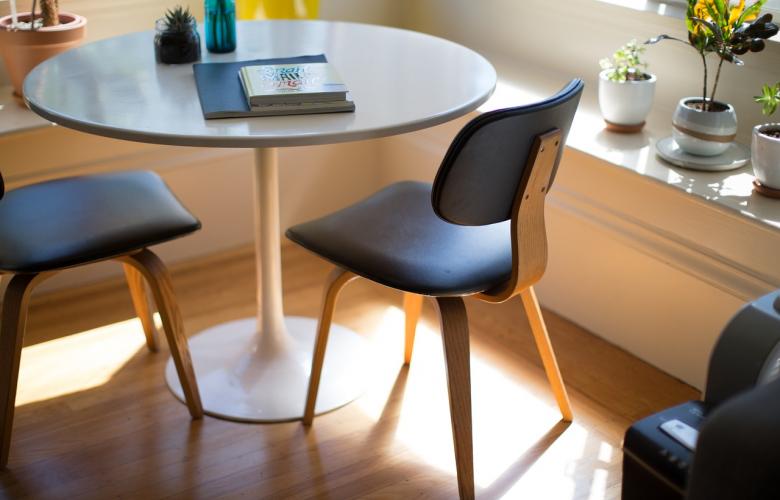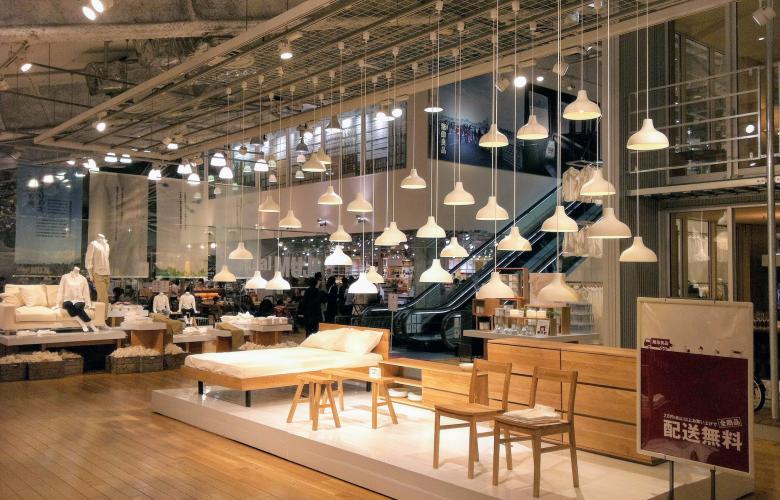Tokyo's small homes and Japan's unique aesthetic are a perfect microcosm for a furniture style that focuses on functionality and simplicity with a timeless style. Whether you're looking for a reasonable and practical selection at a chain store, or some accent pieces to add to your collection, Tokyo's furniture stores have unique designs, restored items, hand-selected pieces and a strong ethos for the role your piece should play in your home and life.
Furniture stores in Tokyo
Nitori
The country's version of Ikea, Nitori is a chain selling affordable furniture with over 400 stores across Japan. Founded in 1967 by Akio Nitori who remains president, the company sells modest and functional pieces for all areas of the home. While the designs may not be as inspiring as elsewhere, they have all bases covered and include ranges of seasonal pieces which allow you to create a traditional Japanese home without spending a fortune.
Muji
A stylish and trendy store known for good quality, Muji is one of the most well-known brands outside of Japan. Suited to the minimalist strain of Japanese aesthetic, the store focuses on functional design with natural and high-quality materials. Meaning 'no brand', the name signifies a strict style applied to all products, packaging and even store design, with no logo and an ability to suit a wide range of homes and lifestyles.
Offering everything from snacks to sofas, the company can furnish a home, feed the family within it and have even branched out into designing fully equipped tiny pre-fab homes. For larger furniture, the prices are higher than Nitori, but reflect the quality and style as well as a slice of that minimalist lifestyle that is so very Japanese.
Wood You Like Company
Specialising in wooden furniture, Wood You Like Company offers pieces crafted from single boards of five selected types of wood: cherry, walnut, maple, oak and Japanese ash. The company controls each aspect of the process, from design to production and allows for modifications and alterations to their designs to suit the customer. Each piece is finished by a single craftsman ensuring full attention to the finish is achieved, much like a hand-made item.
Started in Akishima in 1983, the company offers timeless designs that mix traditional and Scandinavian throughout the range. As you would expect with the level of care and devotion paid to each piece, the prices are quite far beyond those of Nitori and even Muji, but are reasonable for pieces that will last a lifetime.
Building Fundamental Furniture
Combining custom-made, vintage and selected furniture, Building Fundamental Furniture is a store that offers a fantastic selection of sleek and timeless pieces. Focusing on the term fundamental, the company endeavours to create and source pieces that serve as the foundation of life, trasferring seamlessly between the changes and developments in the owner's life.
With a team of local artisans based in a workshop in Tokyo's suburbs, custom-made pieces can be adapted to the room size, budget and the environment, with materials and style all open to discussion. The personal designs of Yosuke Nimura are unique and instantly recognisable for their ability to combine delicacy with function.
D & Department Tokyo
Focusing on long-lasting design, this Setagaya store has a wide range of products from furniture to smaller items, and was launched by designer Nagaoka Kenmei almost two decades ago. Determined to introduce the 47 prefectures of Japan to the rest of the country as well as the world, the company includes travel features, food and a whole-lifestyle approach to furnishing as a part of the experience. The importance of creating long-lasting pieces is reflected in their 10-step guide, including the importance of an ability to repair, a joy of creating, a timeless style, affordability and, of course, beauty. When selecting their items they consider five key elements: knowing the creator, using it themselves, suitability for resale, ability to be repaired and a long history of creation. By eschewing fashion trends and the modern trend for upgrades and disposable items, the brand offers a considered and attentive approach to furnishing the homes of Japan.
Wise Wise
A furniture company with a sustainable focus, Wise Wise is dedicated to its ethos of 'creating peace and comfort in life', extending this notion not only to their customers but to the environment too. Using only wood which can be traced and verified as coming from an ethically approved source, it has received the FSC/CoC (Forest Stewardship Council Chain of Custody) certificate. Wise Wise also uses domestic timber wherever possible in a bid to reviatalise the forestry industry and struggling timber economies across the country. Not only ethical, the company's pieces are beautifully designed; its first design was awarded the grand prize at the International Furniture Fair in Singapore over a decade ago and its 'Kurikoma' chair won the Good Design Award in 2012.
Check out Nakameguro to shop-hop independent furniture retailers too.
Smaller pieces and decor
For the final touches to your home, you may be looking for some Japanese inspiration, and needless to say, there are some great independent and larger stores to try. Markus in Kichijoji is a hub of items sourced from across Japan, hand-selected by designers who travel to meet creators and learn about their processes. Especially good for pottery, they sell a variety of home items and rather than going with an item in mind, it is perhaps better to arrive and see what catches your eye. Secondly, the aforementioned Wise Wise have a second store named Wise Wise Tools in Roppongi which aims to give small designers an opportunity to see their creations. Focusing on traditional crafts, the items are not only beautiful, but a slice of Japanese tradition in need of support. Located in Tokyo Midtown in Roppongi, the shop is next to 2121 Design Site and elevates the traditional items to a luxury setting and well-heeled clientele.
European designers
If you are looking to combine your Japanese furniture with European pieces, there are a good selection of stored offering Italian and Scandinavian design as well as antique pieces—all of which are growing in popularity in Japan thanks to a shared aesthetic.
An Italian company who has been furnishing Japan since 1969, Arflex takes its name from arredamenti, Italian for furniture, and flexibility to reflect its simple goal. Originating from an experimental group of designers who used alternative materials including foam rubber, the firm is now synonymous with contemporary design and unusual styles.
For Scandinavian pieces, try Bo Concept—a Danish store with high price tags but an undeniably stylish and contemporary style. Cibone is a Swedish design store combining an antique style with a modern sleek finish with smaller items also available alongside the furniture.
For antiques of British or French origin, Geographica is one of the best options in Tokyo as the owner received his restoration certificate in the UK. Carefully restoring pieces sourced directly from abroad and carefully returned to their original state including lighting, large furniture and smaller decorative items.
By Lily Crossley-Baxter
Similar to this:
When East meets West: The contradictions and concessions of the modern Japanese home
Making a house a (typical) home in Japan
6 elements of Japanese traditional architecture






